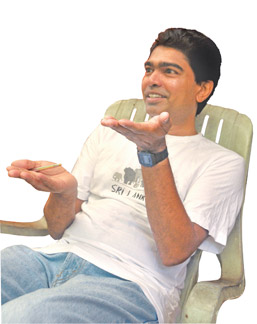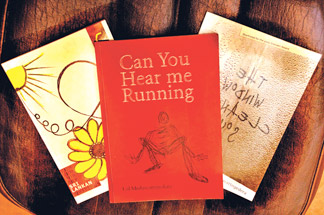|
'All of us are political, while some of us choose to
remain depoliticized for different reasons' - Lal Medawattegedara:
 |
|
Lal Medawattegedara. Picture by Saman
Sri Wedage |
Politicised by choice
SAJITHA PREMATUNGE
How do you teach social cohesion to a seven-year-old? Easy, just read
to them 'A Cat, a Rat and a Snake'. Because that is what it is, a fable
in the guise of a children's story. 'Live and let live' is Mapo the
protagonist cats 'catosophy' in this story by Lal Medawattegedara,
included in Milk Rice - Stories for children. His genius lies in this
versatility. He is one of those writers who is equally competent in
writing conflict stories as well as children's stories.
Lal Medawattegedara, this week's encounter on Daily News Artscope, is
a journalist turned writer turned academic. He is 'trying hard not to
run away from finishing his first novel', between reading for his MA at
Peradeniya and working as an English literature lecturer at the Open
University. He is also currently engaged in compiling a children's story
collection, which might see the light of day before his novel.
Q: What prompted you to write children's stories?
A: Since 2003 I have been engaged in creative writing projects
for children. Having conducted many workshops for children, when someone
asked me why I have not written any children's stories, I was ashamed.
This is what initially induced me to write children's stories. When
Perera Hussein Publishers came up with the Milk Rice - Stories for
children project I submitted the story 'A Cat, a Rat and a Snake', which
received good reviews, which further encouraged me.
Q: What is the moral behind 'A Cat, a Rat and a Snake'?
A: Social cohesion. The cat, a four legged animal that hunts
animals for food or fun, is on top of this power chain, the snake is
perhaps on the same level as the cat and the rat is at the bottom, often
the victim. In the story I try to depict how these three different
creatures learn to coexist within this power structure, while respecting
each others territory and rights. In fact the story came out at the
height of the war.
Q: As the main resource person of 'First Flight' (British
Council's Young Learner's Centre creative writing project) do you
believe that young writers are rooted in Sri Lankan culture?
A: The definition of Sri Lankan culture is vague and
subjective. Some Sri Lankan children are more cosmopolitan than others;
they are rich and can afford travel. These experiences invariably seep
into their writing. Moreover any writer is influenced by what he or she
reads. As far as setting goes, anyone will select a setting that he or
she is familiar with. Whether the setting is local or foreign should not
be a problem as long as the writer knows what he or she is talking
about.
Q: Can this be termed as Sri Lankan literature?
 |
|
Awards
and accolades
His very first attempt at
fiction, The Window Cleaner’s Soul, a collection of short
stories, was short-listed for the 2002 Gratiaen Award. His
short story ‘Tears Of A Coffin Maker’ was broadcast on BBC
Radio 4 and BBC World Service. He also won the first place
in the 2006 short story competition conducted by the English
Writer’s Co-operative for ‘Can You Hear Me Running’. |
A: It depends on how Sri Lankan literature is defined. If Sri
Lankan literature is writing that is 'set' in Sri Lanka, then such
writing would not qualify. But, in my view, literature is not about
setting only. It is about human emotions and human reaction to the
immediate environment. It is difficult to pinpoint Sri Lankan literature
within the wider definition of literature. I think what is loosely
referred to as Sri Lankan literature is literature on Sri Lankan context
and consciousness by Sri Lankan writers.
Literature is a combination of social, political, economical and
psychological aspects. I would not attach a definition to it, especially
where young writers are concerned. They write about what they are
familiar with and in my opinion this should not be discouraged. We
cannot force a child to write about a culture he or she feels alienated
from.
Q: What other writers have influenced your writing and how?
A: I used to like Rushdie for his word puns. He plays a lot of
gymnastics with the language. Gabriel Garcia Marquez's unexpected twists
inspired me. I like Toni Morrison for her particularly feminist style of
writing. I have also been influenced by Jean-Paul Sartre. Milan Kundera
and Ismail Kadare had a deep impact on how I approach writing. I am
especially attracted to Yasmine Gooneratne's flawless style of writing,
which is ideal for prose. I can't really discount any writer. I have
taken a little bit from everyone.
Q: Is all your work based on research? How do you go about it?
A: I engage in research whenever I am in doubt. For instance,
in the case of 'Can you hear me running', I spoke to a few people in the
army to learn about the mechanism of guns. For 'Tears of a Coffin
Maker', which involves a prison break in Matara, I spoke to people in
the area and went through a lot of photographs of Matara and took eye
witness testimonies of how the tsunami ravaged the Matara town.
Q: In 'Can You Hear Me Running' you criticise class
prejudices. Is it pragmatic to expect a society to completely denounce
these values?
A: Class differences are inevitable in any country. But I try
not to give labels. My duty as a writer is not to push ideas into
people's heads, but perhaps to demonstrate what class prejudices do to
people. The class system is a power struggle.
This creates a lot of anger. In fact most of the conflicts in Sri
Lanka are a result of this power struggle. This is never more apparent
than in Martin Wickramasinghe's novels. It is because of such ridiculous
values that Nanda in Gamperaliya finds it so difficult to find a
partner.
Q: Social criticism in some of your stories involves
satirising the attitudes of lower middle-class, please comment.
A: Consciously or unconsciously I may have used satire to
point out that some of the attempts made by individuals of the lower
middle-class to imitate those of the upper-class is ridiculous.
Q: Do you believe that you have been successful at accurately
depicting the lower middle class?
A: I have done my best, not to depict the lower middle class
per se, but to depict their values and ideologies.
Q: You use a lot of vernacular in your writing. Why and how do
you use it to develop and enrich characters?
A: Vernacular reflects a character's particular position in
society. For instance the language of a three-wheeler driver is quite
interesting and sets him apart from the rest of the society. Using
vernacular in the dialogue makes him a unique individual, thereby
developing the character. Moreover certain expressions are extremely
difficult to capture in English. In such instances I use vernacular.
Q: Does the English language create class distinctions in Sri
Lankan society?
A: English has already created class distinctions. This is why
it is referred to as the 'Kaduwa'. But this is gradually diminishing,
since English is more accessible and no longer the exclusive property of
the elite few.
Q: Most of your stories are gloomy and negative, why?
A: Maybe there is something to learn in suffering. When things
are going good you tend to get complacent.
Q: Does 'To Die For' suggest a certain numbing of political
opinion in the younger generation?
A: It focuses on a person who has failed to understand the
politics in a highly politicized situation. This is true in real life.
Even while the insurgency was taking place there were people who were
completely oblivious to what was going on.
Perhaps the younger brother in the story did not understand the
politics behind it because he was just a 12 year old boy at the time of
the insurgency. Different politics have replaced the politics of the
time in which the story commences. All of us are political, while some
of us choose to remain depoliticized for different reasons.
Q: Should politics play any part in university education?
A: A person is eligible to vote at the age of 18. This means
that he or she is already political. Moreover university education is
geared to teach them to look at concepts critically.
Q: 'Appreciations' is a one of a kind story, what prompted you
to write it?
A: Obituaries have a tendency to always focus on the good of
the dead. I found this a little too hard to believe. This is why I wrote
a satirical counteractive obituary.
Q: How has the conflict affected your writing?
A: There are three stories which are the result of the direct
influence of the conflict in 'Can You Hear Me Running': the title story,
'Poetic Licence' and 'The Last War'. A writer is conditioned by the
political situation in which he or she is in and his psychological frame
of mind is decided by it. When the conflict was at its height I missed
bombs by inches. I was stuck in three hour traffic jams when roads were
close for the safe passage of VIPs. I waited for hours in buses so every
single vehicle could be checked by the army.
As a journalist I was exposed to the insurgency as well as the war
against terrorism. During the insurgency I remember writing names of at
least 50 people who died, every single day for nearly three months.
These experiences invariably influenced my writing.
Q: 'The Last war' empathizes with the suicide bomber, please
comment.
A: It does not empathize with the act of 'suicide bombing',
but rather the suicide bomber as an individual through bringing to light
the kind of conditions that drove her to become a suicide bomber in the
first place.
Q: Does conflict literature romanticise war?
A: According to research, literature tends to promote war.
Conflict literature could be of two types: those that blatantly promote
war and those that demonstrate the suffering of war. The common belief
is that literature that portrays suffering tends to promote anti-war
sentiments, I have my doubts. According to Freud, human beings carry
primitive instincts of violence at their core. If so, I have my doubts
that a poem about suffering will actually touch those instincts.
|



